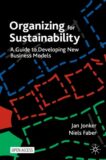Auteur(s): Jan Jonker, Niels Faber
Publicatie: augustus 2021
Prijs: gratis download
Taal: Engels
This upper-level Open Access textbook aims to educate students and professionals on how to develop business models that have a positive impact on people, society, and the social and ecological environment. It explores a different view of how to organize value creation, from a focus on an almost exclusively monetary value creation to one that creates positive impact through multiple values.
The book offers students and entrepreneurs a structured approach based through the Business Model Template (BMT). It consists of three stages and ten building blocks to facilitate the development of a business model. Users, be they students or practitioners, need to choose from one of the three offered business model archetypes, namely the platform, community, or circular business models. Each archetype offers a dedicated logic for vale creation. The book can be used to develop a business model from scratch (turning an idea into a working prototype) or to transform an existing business model into one of the three archetypes. Throughout the book extra sources, links to relevant online video clips, assignments and literature are offered to facilitate the development process.
This book will be of interest to students studying the development of business models, sustainable management, innovation, and value creation. It will also be of interest executives, and professionals such as consultants or social entrepreneurs seeking further education.
This book is open access, which means that you have free and unlimited access
This book is supported by a Massive Open Online Course (MOOC) by the authors, follow for free as off September 1st 2021
Contains a variety of teaching resources, with case studies, glossary, and five alternative routes to use the template
Reconceptualises the notion of value creation with the demands of sustainability, circularity and social inclusivity



